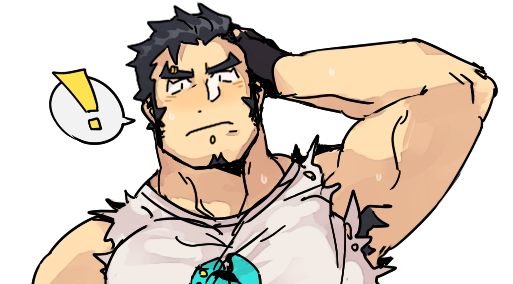
Let’s Play a Love Game: The problem with parody
Eric Cline ponders the limits of satire.
At its core, this column is centered around one question: what makes dating sims work? Though my topics vary from narrative choices to aesthetics and gameplay, it all comes down to evaluating what makes each game tick. The unspoken extension of that line of thought, however, is an inverse question: when do dating sims fail? Such is the quandary raised by Saturn’s 2018 indie release Worst Dating Sim. Described within its opening disclaimer as a shitpost that’s not meant to be taken seriously, Worst Dating Sim nonetheless seeks to highlight genre conventions in the way only parody can. In actual execution, however, it waivers between adherence to said premise and a more straightforward embrace of dating sim tropes.
To evaluate Worst Dating Sim’s status as a parody, it may be worth addressing both what parody means and what exactly the game is attempting to spoof. Dating sims are narratively driven games in which the player’s choices throughout have repercussions on the main character’s relationships with the rest of the cast. Most often this means nurturing (or squandering) romantic connections, often through dates and other time spent together exploring common hobbies and points of view. As one progresses through the story these relationships tend to grow more intimate, often ending in some sort of proclamation of love or at least an intention to continue dating into the future.
Parody, meanwhile, is defined by Merriam-Webster as “a literary or musical work in which the style of an author or work is closely imitated for comic effect or in ridicule” (“Parody”). While I don’t think Worst Dating Sim approaches its subject matter with ridicule, the concept of imitation is a crucial one to consider while playing. “Style” with regards to dating sims can encompass any number of attributes being inverted, subverted, or otherwise played around with: common narrative and thematic concerns, gameplay elements, tone, and more.
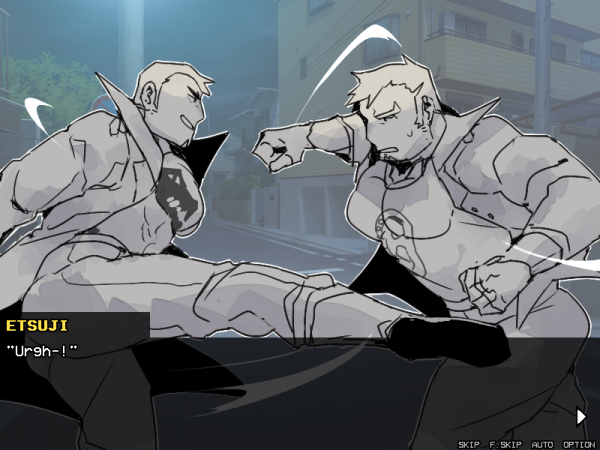
Worst Dating Sim is the story of an 18-year-old high school student named Shujinko who is deathly afraid of two things: walking home in the dark, and violent criminals. Naturally, Shujinko literally runs into a gang member one night on his way home and must then say exactly what the man wants to hear, or else risk getting knocked the fuck out. The gangster, a slightly older man named Etsuji, then begins to spend time with Shujinko and their relationship develops from there.
The prospect of violence continues beyond the characters’ first meeting. Almost all dialogue choices throughout have only one viable answer, while all others end in Etsuji (or occasionally other characters) punching Shujinko’s lights out. These KOs trigger the game’s Game Over screen, which players will become very familiar with very quickly. Staggeringly, Worst Dating Sim sports over sixty premature bad endings. Of course, bad ends are a genre staple that exist largely to highlight their counterparts: good ends. One’s result of achieving a good or bad end is dictated by various choices made throughout the narrative, thus introducing a sense of interactivity and player control within a genre largely built upon the relatively passive visual novel format. In one sense, bad ends represent a failure to complete a game’s objectives, most specifically courting any of the romanceable characters.
Even by genre standards, Worst Dating Sim‘s bad ends stand out for several reasons. The most jarring is their brevity. In many dating sims, bad ends will still bring the narrative to a fairly tight finish. Time is allotted to resolve at least some plot threads, and the bad end doesn’t completely sneak up on the player. Not so here. If Shujinko says something Etsuji doesn’t like, the game generally ends within about two to five lines of dialogue. This bluntness is made all the more painful by the game’s key advertised gameplay quirk: a complete and utter lack of any save function. While saving is a key component of almost all video games for obvious reasons, it is especially important in dating sims. Saving in this genre doesn’t just mean maintaining one’s progress across sessions, but it also allows players to mark key points to return to in subsequent playthroughs. Due to their multitude of endings, dating sims are literally impossible to complete within a single playthrough. Thus, save functions serve as means of limiting the amount of time players’ have to waste rereading content that they have already seen.
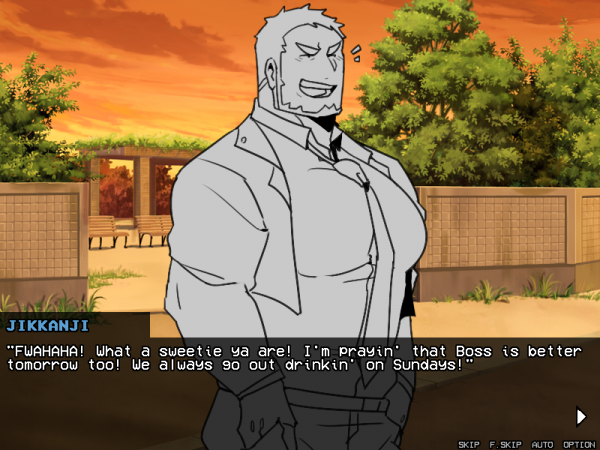
It’s through this combination of no saving and the constant threat of a Game Over that Worst Dating Sim comes most dangerously close to living up to its name. My frequent returns to the home screen weren’t so bad within the game’s first twenty minutes, as I was still struck by the novelty of the concept. I was also curious to see how Etsuji’s character would be fleshed out by way of learning what exactly pissed him off.
Unfortunately, there’s little to be gleaned from Etsuji’s violent outbursts. These moments reinforce Etsuji’s status as an easily angered character, but that’s it. He will lose his cool over the slightest annoyance or disagreement, so none of his reactions actually feel deeply rooted in specific circumstances. On a meta level, the joke aspect of the premise also loses its impact each time the “Shujinko speaks –> Etsuji gets mad –> Game over” pattern repeats itself. It then becomes downright unforgivable as one struggles with proper answer selection just to get decked and then start over from the very beginning with no prior save file to return from.
On the bright side, I can say that the correct choices (specifically those that don’t result in a Game Over) are thematically consistent. Above all else, Etsuji reacts well to statements that are authentic and sincere. This doesn’t necessarily mean truthful. For example, when Shujinko first meets Etsuji he uses a false threatening bravado despite knowing he couldn’t hurt Etsuji if he tried. Nonetheless, Etsuji respects the fact that Shujinko expresses his genuine feelings of frustration and thus opts to let him go unpunched.
Though the game largely seeks to parody via what it lacks, equally notable are the genre elements it plays straight. It would be impossible to make a parody dating sim, after all, without including the bare bones of what constitutes a dating sim in the first place.
From a gameplay perspective, the most indispensable traditional mechanic present here is the Fast Skip option. As in countless other dating sims, it is a tool enabling the player to skip forward past dialogue to the game’s next choice menu. In this way Worst Dating Sim shows basic respect for the player’s time, even despite the lack of a save feature. Being unable to pause mid-game and return to it later at one’s own pace is annoying, but the thought of having to manually click through every single piece of dialogue on every playthrough? That’s a level of tedium even this game isn’t willing to broach.
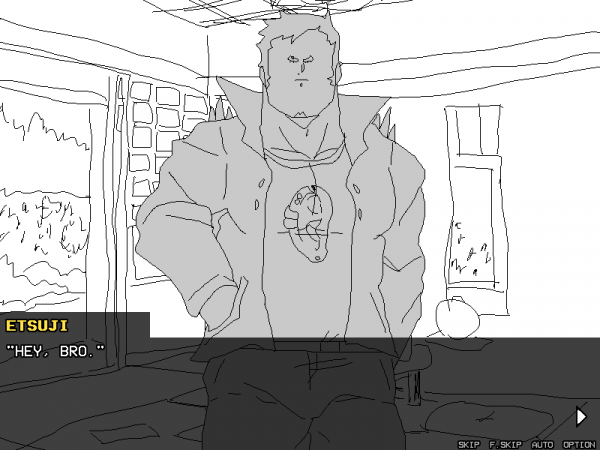
As a player I’m thankful, though it gives me mixed feelings as a critic. Given how important the feature is to the player experience it seems strange that the game and marketing material don’t remark upon it at all. Even just some brief lampshading would help alleviate the lack of commentary in a game so intrinsically concerned with genre norms and the essential nature of various gameplay tools.
Beyond its unique gameplay quirks, Worst Dating Sim often barely reads like a parody at all. Some of the characters are exaggerations of certain tropes, but that doesn’t make them any less endearing. In Etsuji’s case he’s the ultimate standoffish, hard-to-get love interest but beneath his tough exterior (and behavior) he has a heart of gold. Hints are slowly dropped throughout regarding his life and interests, to the point of foreshadowing a dramatic trauma reveal. Ultimately the general arc of the main characters’ relationship isn’t any different from that of the romances in a more traditional dating sim.
The narrative experience also feels familiar due to its heavy emphasis on humor. Almost all dating sims use at least some comedy to relieve and/or heighten their dramatic tension. Such is the case with Worst Dating Sim, which makes heavy use of copyrighted material and other popular media à la memes and emojis. As Etsuji and Shujinko bond around town, their exploits are often set to the music of other games, most frequently the Persona games. It’s a smart choice given both Persona‘s consistent history of serotonin-triggering bops and how it brings to mind another game where romance routes are part of the fun. The pop culture references extend into tender moments as well; there’s even a fight scene that takes place within a faux-videogame screen labeled Earthbound Emulator.
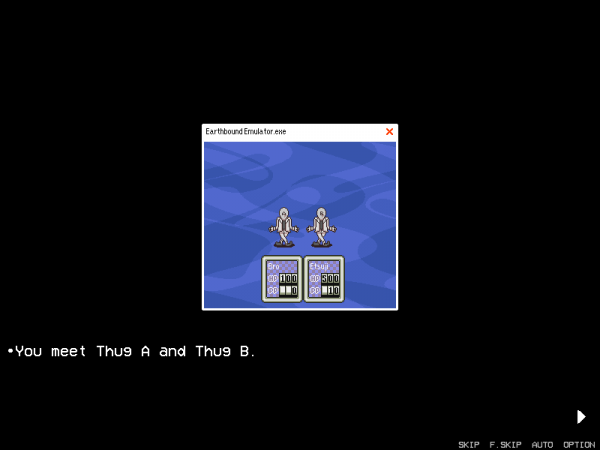
These cultural references are also incorporated visually, like when the protagonists watch Animal Planet together. When the screen changes to reveal what actual animals are being shown on TV, we’re treated to a photo of a giant orange tabby splayed out in such a way that it would be easy to imagine seeing it on a social media feed devoted to cute but humorous animal photos. The idea of Animal Planet effectively broadcasting Lolcatz material is honestly funnier than Etsuji’s sobs as a viewer.
While Worst Dating Sim’s humor and cultural references are among its most distinctive features, they’re also quite discordant with its premise. The game is supposed to be a parody of other dating sims, but there are none among the works it explicitly references. There are no notes of Nitro-Chiral or dreamy daddies, and the only boyfriend present is decidedly not Hatoful. The manner in which Worst Dating Sim draws upon outside media serves to construct its own unique tone and sense of humor rather than provide commentary on contemporaries within its genre.
It’s the game’s story that most clearly epitomizes standard dating sim tropes and structure. While Etsuji and Shunjinko’s relationship starts out more than a little prickly, they quickly bond and grow closer over the course of the game. All the punch-outs the player endures just make Etsuji’s eventual flushed expressions of embarrassment after declarations of affection that much more satisfying to see. The breadcrumbs of information dropped throughout about his tragic family circumstances further emulate standard dating sim storylines, as intimacy brings with it a willingness to share past traumas: the hurt to then be comforted.
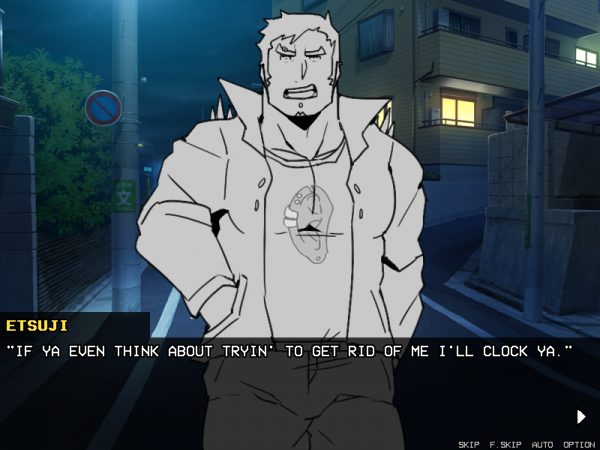
From Dramatical Murder’s Noiz and Koujaku to Hatoful Boyfriend’s aviary full of love interests, dating sims have a long tradition of emotionally damaged characters who seek solace within a player insert character’s embrace. Unfortunately Shujinko and Etsuji don’t trigger contemplation about dating sim protagonists or the nature of their development, but rather adhere to genre conventions without offering any new lens from which to view said conventions. Etsuji in particular is just another tsundere, exceptionally violent though he may be.
Worst Dating Sim doesn’t live up to its title, but it certainly tries. The absence of a save function is truly one of the worst gameplay design choices imaginable in this genre. Coupling this with an abundance of choices that trigger near endless bad ends further exacerbates the problem. With that said, the game’s inconsistency between adherence or deviation from other genre norms ultimately contradicts the premise and prevents the game from becoming truly bad. Parody succeeds by illuminating that which it spoofs, but Worst Dating Sim largely just emulates it. From the lighthearted humor to the protagonists’ steadily deepening relationship, the final result is a bit of a quandary: a game that is ultimately better than strict adherence to its concept would allow, but that by consequence undercuts its own identity.
Eric Cline is a writer from the NOVA area. He is a columnist for Haywire Magazine, manga/anime section editor for AiPT! Comics, poetry editor for Angel Rust Mag, and co-host of the podcasts Queering the Guillotine and Chris and Eric’s Longbox Adventure. You can find him on Twitter @ZorakRichardson.